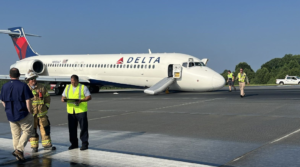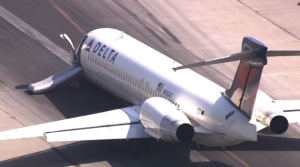 On February 17, 2025, Delta Air Lines Flight 4819, operating a CRJ900 aircraft, experienced a catastrophic crash while attempting to land at Toronto Pearson International Airport. The flight, originating from Minneapolis, carried 76 passengers and four crew members. Remarkably, despite the severity of the incident, all individuals on board survived.
On February 17, 2025, Delta Air Lines Flight 4819, operating a CRJ900 aircraft, experienced a catastrophic crash while attempting to land at Toronto Pearson International Airport. The flight, originating from Minneapolis, carried 76 passengers and four crew members. Remarkably, despite the severity of the incident, all individuals on board survived.
Incident Overview
The aircraft approached Toronto Pearson amidst challenging weather conditions, including snow and wind. As it descended onto the runway, the plane made a hard landing, causing the rear landing gear to collapse. This structural failure led the aircraft to skid uncontrollably, during which the right wing detached, resulting in a significant fuel spill that ignited upon impact. The momentum caused the plane to flip upside down, coming to a halt inverted on the runway.
Passenger and Crew Response
In the immediate aftermath, the cabin was engulfed in chaos. Passengers, disoriented from the inversion, found themselves standing on the ceiling. Flight attendants promptly initiated evacuation procedures, assisting individuals in unbuckling and guiding them towards the emergency exits. Despite instructions to leave personal belongings behind, some passengers retrieved their carry-on items, potentially hindering the evacuation process. Emergency slides were deployed, and all occupants evacuated the aircraft. Eighteen passengers sustained injuries, with two reported in critical condition; however, there were no fatalities.
Emergency Response
First responders, including airport fire and rescue teams, arrived promptly at the scene. They managed to extinguish the flames and provided immediate medical attention to the injured. The swift and coordinated response was instrumental in preventing further casualties. The airport temporarily suspended operations, leading to delays and diversions of incoming flights. Two runways remained closed for several days to facilitate a thorough investigation.
Investigation and Preliminary Findings
The Transportation Safety Board of Canada, in collaboration with the National Transportation Safety Board, has launched an investigation into the incident. Preliminary assessments suggest that adverse weather conditions may have contributed to the hard landing and subsequent mechanical failures. Investigators are examining flight data recorders, cockpit voice recordings, and maintenance logs to determine the exact sequence of events and identify potential mechanical or human errors.
Context and Implications
This event adds to a series of aviation incidents in North America in recent months, raising concerns about flight safety during challenging weather conditions. The incident underscores the importance of rigorous pilot training for emergency scenarios and the need for robust aircraft maintenance protocols. Delta Air Lines has expressed gratitude for the effective response of the crew and emergency personnel, emphasizing their commitment to passenger safety.
As the investigation continues, further details will emerge, providing insights into the causes of the crash and informing future safety measures to prevent similar occurrences.
